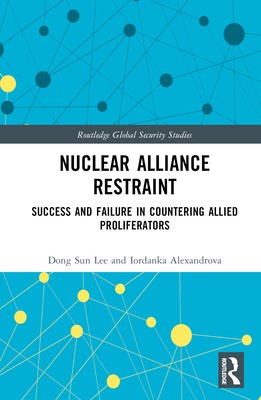
- We will send in 10–14 business days.
- Author: Dong Sun Lee
- Publisher: Routledge
- ISBN-10: 1032914017
- ISBN-13: 9781032914015
- Format: 15.6 x 23.4 x 1.3 cm, hardcover
- Language: English
- SAVE -10% with code: EXTRA
Reviews
Description
This book examines why powerful states have varying success in restraining less powerful allies from acquiring nuclear weapons, based on a broad range of historical case studies.
The outcomes of nuclear alliance restraint primarily depend on two structural factors: the number of superpowers in the global system and the geographical distance between patrons and clients. Through in-depth case studies of South Korea, North Korea, China, and Pakistan, and a comprehensive analysis of 14 historical episodes, the book demonstrates that restraint succeeds when there are two superpowers, with one trying to rein in a distant ally. Conversely, restraint often fails with a single superpower in the system or when nuclear aspirants are close to their patrons. This study has important implications for current nonproliferation efforts, since it suggests that a bipolar world with the US and China as superpowers would enhance counterproliferation effectiveness, reducing nuclear proliferation risks. In addition, an inducement-centered approach adopted early on would be most effective for these superpowers in restraining their allied proliferators.
This book will be of much interest to students of nuclear proliferation, foreign policy, security studies and International Relations.
EXTRA 10 % discount with code: EXTRA
The promotion ends in 16d.04:50:10
The discount code is valid when purchasing from 10 €. Discounts do not stack.
- Author: Dong Sun Lee
- Publisher: Routledge
- ISBN-10: 1032914017
- ISBN-13: 9781032914015
- Format: 15.6 x 23.4 x 1.3 cm, hardcover
- Language: English English
This book examines why powerful states have varying success in restraining less powerful allies from acquiring nuclear weapons, based on a broad range of historical case studies.
The outcomes of nuclear alliance restraint primarily depend on two structural factors: the number of superpowers in the global system and the geographical distance between patrons and clients. Through in-depth case studies of South Korea, North Korea, China, and Pakistan, and a comprehensive analysis of 14 historical episodes, the book demonstrates that restraint succeeds when there are two superpowers, with one trying to rein in a distant ally. Conversely, restraint often fails with a single superpower in the system or when nuclear aspirants are close to their patrons. This study has important implications for current nonproliferation efforts, since it suggests that a bipolar world with the US and China as superpowers would enhance counterproliferation effectiveness, reducing nuclear proliferation risks. In addition, an inducement-centered approach adopted early on would be most effective for these superpowers in restraining their allied proliferators.
This book will be of much interest to students of nuclear proliferation, foreign policy, security studies and International Relations.


Reviews